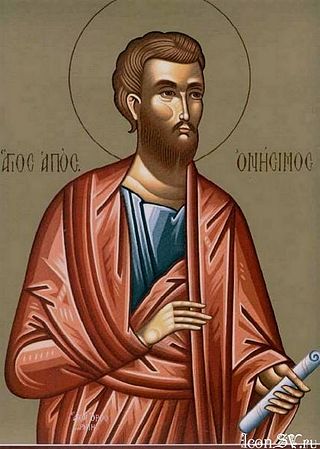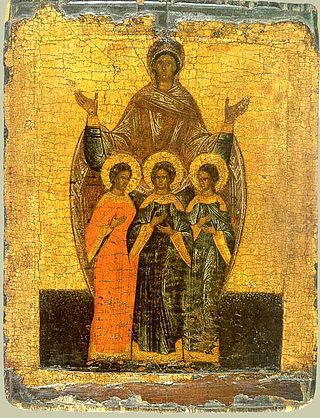Related Research Articles

Onesimus, also called Onesimus of Byzantium and The Holy Apostle Onesimus in the Eastern Orthodox Church, was a slave to Philemon of Colossae, a man of Christian faith. He may also be the same Onesimus named by Ignatius of Antioch as bishop in Ephesus which would put Onesimus's death closer to 107. If so, Onesimus went from slave to brother to bishop.

The calendar of saints is the traditional Christian method of organizing a liturgical year by associating each day with one or more saints and referring to the day as the feast day or feast of said saint. The word "feast" in this context does not mean "a large meal, typically a celebratory one", but instead "an annual religious celebration, a day dedicated to a particular saint".

Saint Valentine was a 3rd-century Roman saint, commemorated in Western Christianity on February 14 and in Eastern Orthodoxy on July 6. From the High Middle Ages, his feast day has been associated with a tradition of courtly love. He is also a patron saint of Terni, epilepsy and beekeepers. Saint Valentine was a clergyman – either a priest or a bishop – in the Roman Empire who ministered to persecuted Christians. He was martyred and his body buried on the Via Flaminia on February 14, which has been observed as the Feast of Saint Valentine since at least the eighth century.

Saints Faith, Hope, and Charity , are a group of Christian martyred saints who are venerated together with their mother, Sophia ("Wisdom").

September 13 - Eastern Orthodox liturgical calendar - September 15

April 29 - Eastern Orthodox liturgical calendar - May 1

May 7 - Eastern Orthodox Church calendar - May 9

May 27 - Eastern Orthodox Church calendar - May 29

August 12 - Eastern Orthodox liturgical calendar - August 14

August 17 - Eastern Orthodox liturgical calendar - August 19

Pudens was an early Christian saint and martyr. He is mentioned as a layman of the Roman Church in 2 Timothy 4:21.

Emerentiana was a Roman virgin and martyr, who lived around the start of the 4th century. Her feast day is 23 January.

Symphorosa is venerated as a saint of the Catholic Church. According to tradition, she was martyred with her seven sons at Tibur toward the end of the reign of the Roman Emperor Hadrian (117–38), or during the reign of Trajan.

Pancras or Pancratius is an Italian saint associated with Taormina and venerated as a Christian martyr. His surviving hagiography is purely legendary. He is, however, recorded in some early martyrologies.
Rictius Varus was a Vicarius in Roman Gaul at the end of the 3rd century, around the time of the Diocletianic Persecution. The Roman Martyrology contains many references to the prefect Rixius Varus, who is said to have persecuted hundreds of Christians. In Christian hagiography he later repented and became a Christian martyr himself, and is regarded a Saint in the Eastern Orthodox and Roman Catholic Churches, with his feast day on July 6.

The First Martyrs of the Church of Rome were Christians martyred in the city of Rome during Nero's persecution in 64. The event is recorded by both Tacitus and Pope Clement I, among others. They are celebrated in the Roman Catholic Church as an optional memorial on 30 June. The Orthodox Church celebrates them on 30 June in its liturgical calendar as pre-1054 East-West Schism Western saints
Helladius may refer to:

The 20,000 Martyrs of Nicomedia refers to victims of persecution of Christians in Nicomedia, Bithynia by the Roman emperors Diocletian and Maximian in the early 4th century AD.

August 28 - Eastern Orthodox liturgical calendar - August 30
References
- ↑ Latin Saints of the Orthodox Patriarchate of Rome
- ↑ Monks of Ramsgate. "Crescens, Dioscorides, Paul and Helladius". Book of Saints 1921. CatholicSaints.Info. 14 October 2012
 This article incorporates text from this source, which is in the public domain .
This article incorporates text from this source, which is in the public domain . - ↑ Janos, S. "The Holy Martyrs Crescentius, Paul and Dioscorides", Holy Trinity Orthodox Church
- ↑ Saavedra, Mauricio. The Church of Smyrna: History and Theology of a Primitive Christian Community Peter Lang, 2015, p. 199, ISBN 978-3631662359
- ↑ The Roman and British Martyrology: Dublin, O'Neill, 1846. p. 167
- ↑ "The Twenty-eighth Day of May", The Martyrology of the Sacred Order of Friars Preachers (W.R. Bonniwell O.P., trans.) The Newman Press, Westminster, Maryland. 1998, p. 111